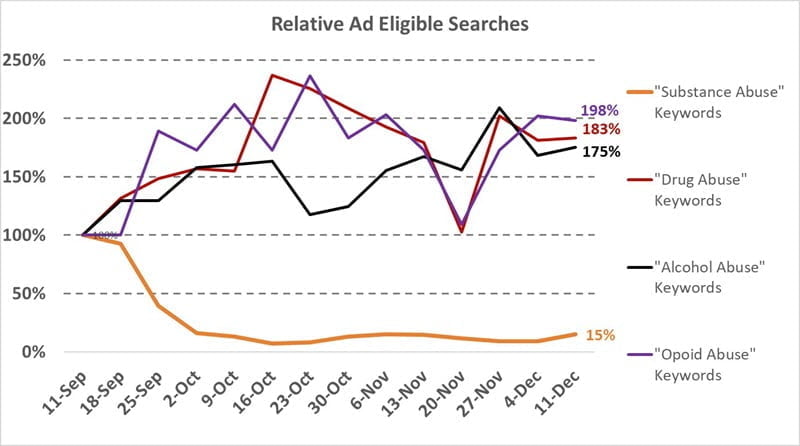There’s no hiding from the opioid crisis that became a national emergency in 2017. An estimated 20 million Americans, or one in every 12 adults, suffer from drug or alcohol addiction. These facts are important and difficult to dismiss. Addiction is a complicated disease with no simple cure. But nearly every recovery program agrees that the first step is to seek help. And as these 20 million Americans, their friends, and their families search for help, many turn to Google to find answers.
However, recent Google ad policy changes complicate the picture of what results people get when they search for keywords related to rehab and drug treatment.
According to a September 14 article in the New York Times, Google released a statement that the search engine has “started restricting ads that come up when someone searches for addiction treatment on its site.” Google cites that some rehab clinics advertising through Google AdWords do not provide the quality care that addicts need to successfully overcome their disease. In response, Google claims to have “stopped selling ads related to those searches.” Following an investigation from The Sunday Times, Google similarly pulled rehab ads in the United Kingdom last week.
It doesn’t appear that these ads have disappeared completely, however. Google Trends data shows that drug rehabilitation searches are steady, while data from 29 rehab facilities advertising through Google AdWords reveals that the number of ad eligible searches on these queries has decreased significantly – down 96%. But Google is still showing some ads on these queries.
Apart from their statement to the New York Times, Google has been quiet about the change to their ad policy. Advertisers bidding on rehab-related keywords were not notified of the change. They did not have their ads or keywords disapproved, but instead suddenly started seeing far fewer ad impressions from these keywords.
Although Google is certainly restricting ads for common terms like “Drug Rehab,” as it said it would, it does not take much work to find other common queries serving a full pack of rehab ads:
It’s not clear whether Google changed how it serves organic listings for these rehab-related searches. If not, search engine users would be able to find those misleading or poor-quality sites anyway.
Google also did not announce additional restrictions for its In-Stream ads on YouTube or its image ads across the Google Display Network (although Google will continue to restrict advertisers from targeting individuals based on sensitive information related to these issues, such as through remarketing.) Additionally, Bing has not changed the way it serves ads for these kinds of searches.
Which Keywords Are Affected?
This policy change leaves rehab advertisers, good and bad, in a confusing gray area. All advertisers are showing fewer ads on rehab terms, but what is and isn’t allowed is unclear to many. Although advertisers are eligible to show on 96% fewer searches containing the word “rehab,” not all keywords are equally affected. Common searches and restrictive keyword match types, such as Google’s exact and phrase match keywords, are showing almost no ads at all, whereas ads are much more common on long-tailed searches, geo-related search terms, dynamic search ads, and modified broad and broad match keywords.
To complicate matters more, impacts to these ads differ vastly among different common semantic strings. Whereas Google is very restrictive of “rehab” keywords, it’s much more lenient on “treatment” and “addiction” related keywords, which still show about a third as much as they did before the new policy. Some advertisers may have discovered that “counseling” related keywords have been unaffected, resulting in twice as many ads from these keywords now.
More complex and long-tailed keywords may also be further exempt from Google’s policy. Searches about different kinds of substance abuse are treated differently – keywords around “substance abuse” are largely ineligible for ads, whereas “drug abuse” or “alcohol abuse” keywords now serve even more ads.
The current drug and alcohol addiction crisis is a complex one and unfortunately may not have any simple viable solutions. Seeking help and starting a conversation will always be the first step to recovery, and Google and its advertisers have a real responsibility to provide answers to those seeking help. Google’s new ad policy may remove some qualified professionals from that conversation. At worst, the unclear policy change could restrict policy-abiding advertisers and open loopholes for sketchy advertisers to benefit from.
Data Sources
Data is based on a sample size of 29 accounts (WordStream clients) advertising on keywords related to drug and alcohol rehabilitation and similar services on the Google Search Network between September and December 2017. Ad eligible searches were calculated by estimating the number of ad impressions these keywords would have with 100% impression share.
About the author
Mark is a Senior Data Scientist at WordStream, focused on research and training for the everchanging world of PPC. He was named the 5th Most Influential PPC Expert of 2017 by PPC Hero. You can follow him on Twitter, LinkedIn, Google +, and SkillShare.

